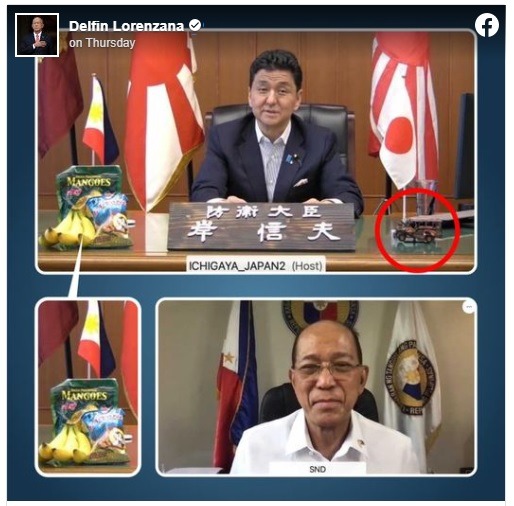By Dan Steinbock
– Recently, the defense secretaries of Japan and the Philippines agreed on “enhanced defense cooperation.” As Tokyo and Washington would like Manila to join the Indo Pacific coalition, even mangoes and bananas play a role.
The headlines were ecstatic: “Japan’s defense chief stuns Lorenzana with PH mementos during meeting” (Inquirer, June 4, 2021).
During a video conference with Defense Secretary Delfin Lorenzana, Japan’s defense minister Nobuo Kishi adorned “his table with Philippine fruits like mangoes and bananas.” plus “a scale model of a jeepney” (Figure 1).
Figure 1 Kishi-Lorenzana internet conference
 Source: Screen capture posted by Defense Secretary Lorenzana on Thursday, June 3, 2021)
Source: Screen capture posted by Defense Secretary Lorenzana on Thursday, June 3, 2021)
Free Reports:
 Sign Up for Our Stock Market Newsletter – Get updated on News, Charts & Rankings of Public Companies when you join our Stocks Newsletter
Sign Up for Our Stock Market Newsletter – Get updated on News, Charts & Rankings of Public Companies when you join our Stocks Newsletter
 Get our Weekly Commitment of Traders Reports - See where the biggest traders (Hedge Funds and Commercial Hedgers) are positioned in the futures markets on a weekly basis.
Get our Weekly Commitment of Traders Reports - See where the biggest traders (Hedge Funds and Commercial Hedgers) are positioned in the futures markets on a weekly basis.
Moved by Japanese courteousness, Lorenzana “looked forward to the upcoming activities and projects between our two countries.” Other headlines suggested the kind of projects the two had in mind: “PH, Japan defense execs express ‘grave concern’ over South China Sea issue” (Rappler), “Lorenzana welcomes UK carrier’s voyage to SCS” (PhilStar).
Juicy fruits aside, the real story is the ongoing effort by Washington and Tokyo to lure the Philippines into the Indo-Pacific containment alliance against China.
Kishi’s geopolitical goals
Until recently, Nobuo Kishi has been a rising star in the Japanese Liberal Democratic Party (LDP). Although he is the brother of Japan’s ex-PM Shinzo Abe, he was adopted soon after his birth by a maternal uncle. He heard about his real parentage and his brothers, Shinzo and Hironobu Abe, only when he entered university.
Until the early 2000s, Kishi worked in Sumitomo Corp., a huge multinational trading conglomerate. Then he morphed into a politician. Backed by his brother Shinzo Abe, he was elected in 2004 to the Upper House of Japan’s parliament where he profiled himself as a security expert.
In 2012, when Abe began his reform gamble, Kishi won a seat in the House of Representatives and was appointed to Senior Vice Foreign Minister. In this job, his key goal was to promote the Japan-Taiwan ties. It was Kishi who maneuvered the historical meeting with PM Abe and Taiwanese opposition leader Tsai Ing-wen in 2015, prior to the latter’s presidency and Trump’s 2016 triumph.
Like Shinzo Abe, Kishi is a member of the revisionist far-right Nippon Kaigi, and several other center-right groups. He supports the revision of the Constitution’s “pacifist” Article 9; and tougher policies against China.
South Korean scenario, with Indo-Pacific characteristics
Kishi pushes for a new Japan that’ would acquire strike capabilities against North Korea, “as a defensive measure.” The effort is reminiscent of the South Korean scenario.
Under President Park Geun-hye, prior to her impeachment for corruption in 2017, South Korea’s defense authorities managed to have U.S. THAAD anti-missile systems based in the country. Presumably, THAAD is against potential threat against North Korea; in practice, China and Russia could also be targets.
Both China and Russia have proposed the denuclearization of the Korean Peninsula and the replacement of the ‘50s armistice with a genuine peace treaty. That, however, does not appeal to Pentagon or its contractors, both of which have economic and geopolitical interests of their own.
Kishi hopes to nuclearize Japanese military over time. Since the peoples and democracies of Asia shun such goals, the Indo-Pacific effort focuses on defense chiefs and foreign ministers – that is, Defense Secretary Lorenzana and Foreign Affairs Secretary “Teddy” Locsin in the Philippines – mainly to create a fait accompli situation that would be hard to reverse.
Ultimately, Kishi’s ultra-hawkish ideas draw from the legacy of his controversial grandfather.
Kishi’s political dynasty: public rhetoric, covert muscle
Known for his pro-cartel policies and praise of Nazi Germany as the model for Japan, Nobusuke Kishi’s brutal reign in Japan’s puppet state Manchukuo in the 1930s earned him the nickname the “Monster of Manchuria.” Under his rule, Chinese workers were exploited as slave labor, while Chinese and Korean women were rounded up to serve in the “comfort women corps.”
In the early ‘40s, Kishi served in PM Tojo’s wartime cabinet that signed the war declaration against the US. After World War II, Kishi was imprisoned three years as a suspected Class A war criminal. While the elderly Tojo was hanged, Kishi was released, despite the heavy charges.
In exchange, Kishi would execute Washington’s goals in Japan. As prime minister, he hammered Japan into the 1960 security pact with the US, which paved the way to the LDP’s single-party monopoly. According to historians, LDP was supported by CIA’s monies well into the 1970s.
The Treaty unleashed the largest protests in modern Japanese history that forced Kishi to resign in disgrace.
Japan’s new political volatility
When Nobuo Kishi was named PM Yoshihide Suga’s Minister of Defense in September 2020, stars still seemed well-aligned for the rising political star. But that’s when the LDP was hit by a vote-buying and a separate bribery scandal. Second, the COVID-19, which the LDP had downplayed for months, caused a major crisis.
Since 2012, Abe’s cabinet had had a largely strong approval rating until the recent political volatility. But today half of the Japanese disapproves the LDP cabinet (Figure 2).
Figure 2 Japanese PM’s Cabinet approval rating over time
 Source: Data from Real Politics of Japan
Source: Data from Real Politics of Japan
When Suga replaced Shinzo Abe in September 2020, his cabinet enjoyed ratings of 70 percent. In early 2021, those ratings plunged to 30 percent. By April, PM Suga’s ruling party lost all three seats in parliamentary by-elections, with polls widely seen as a bellwether for a crucial Lower House election later this year.
Anger with the political scandals, the government’s mishandling of the pandemic, compounded by the tortuously slow vaccine rollout, contribute to rising political volatility in Japan, which suffers from secular stagnation and an aging, declining population.
The role of the Philippines
As Japanese politics is amid new uncertainty, the pre-2022 election positioning is rising in the Philippines where President Duterte has cautiously navigated between great power interests in Southeast Asia.
As Duterte is mulling over the fate of the Visiting Forces Agreement (VFA) with the US (which its proponents claim is an “improved” version), he had to issue a gag order over South China Sea to his cabinet, to contain odd public speculation.
Despite defense secretary Lorenzana’s delight with Kishi’s Philippine mangoes and bananas, it remains to be seen what Manila will gain for US/UK “freedom of navigation operations” in the region. As elsewhere, such operations may well contribute to accidental or purposeful conflicts. In turn, such conflicts could effectively undermine the promise of the anticipated “Asian Century.”
Rearmament drives and geopolitics are the best way to derail economic development and rising living standards.
As the Philippines is being dragged and courted into a China containment coalition, even juicy fruits cannot hide the increasingly assertive Indo-Pacific games.
About the Author:
Dr. Dan Steinbock is an internationally recognized strategist of the multipolar world and the founder of Difference Group. He has served at the India, China and America Institute (USA), Shanghai Institutes for International Studies (China) and the EU Center (Singapore). For more, see https://www.differencegroup.net
Based on Dr Steinbock’s global briefing of June 4, 2021

- The Dollar Index strengthened on Powell’s comments. The Bank of Mexico cut the rate to 10.25% Nov 15, 2024
- EURUSD Faces Decline as Fed Signals Firm Stance Nov 15, 2024
- Gold Falls for the Fifth Consecutive Trading Session Nov 14, 2024
- Profit-taking is observed on stock indices. The data on wages in Australia haven’t met expectations Nov 13, 2024
- USD/JPY at a Three-Month Peak: No One Opposes the US Dollar Nov 13, 2024
- Can Chinese Tech earnings offer relief for Chinese stock indexes? Nov 13, 2024
- Bitcoin hits an all-time high above $88,000. Oil remains under pressure Nov 12, 2024
- Brent Crude Stumbles as Market Sentiments Turn Cautious Nov 12, 2024
- Bitcoin hits new record high just shy of $82,000! Nov 11, 2024
- The Dow Jones broke the 44 000 mark, and the S&P 500 topped 6 000 for the first time. The deflationary scenario continues in China Nov 11, 2024
